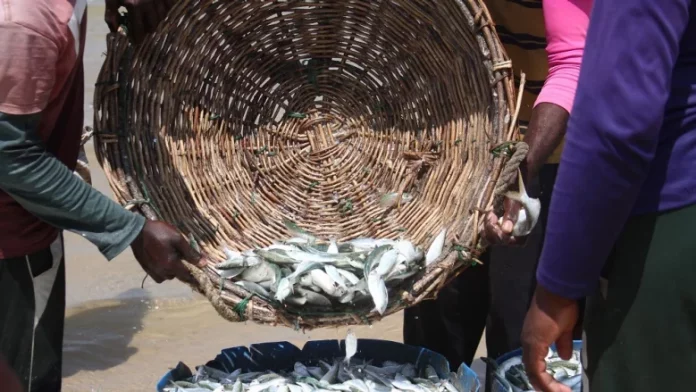The Ceylon Fisheries Corporation (CFC) is under renewed scrutiny after former chairman Lalith Daulagala and three senior officials were arrested by the Bribery Commission for alleged corruption tied to a 2020 equipment purchase.
The defendants include managing director Chandana Krishantha, supply manager Vijith Pushpakumara and operations manager Anura Chandrasena Bandara.
The accusation centres on the purchase of a vacuum-packaging machine capable of processing up to 2,000 kg of fish per hour that was bought outside the statutory procurement process and, according to the Commission, was unnecessary.
The alleged result: a loss to the government of Rs. 5,856,116. In addition, the supply manager is charged with demanding and accepting a bribe of Rs.100,000, credited to his personal account, in return for releasing part of payment (Rs. 928,058.20) due to the supplier.
When produced before the Colombo Chief Magistrate’s Court, the court granted bail under two surety bonds of Rs. 1.5 million each, and ordered the suspects to surrender passports.
This scandal arrives against a backdrop of long-standing financial fragility at the CFC. Audit reports reveal that for the year ended 31 December 2019 the auditor issued a disclaimer of opinion, citing insufficient audit evidence and significant uncertainties over the corporation’s financial statements.
Earlier reports show that even basic accounting and timely submission of statements have been neglected.
According to sector data, the fisheries industry remains a valuable yet under-optimised part of Sri Lanka’s economy: the marine fish catch in recent years exceeded 400,000 MT, and the fisheries sector contributes about 2.3 % of export earnings.
Within this context, CFC was recently singled out by the Minister of Fisheries, who confirmed that the Corporation had been loss-making, burdened by an excessive payroll and poor management practices, including “malpractices and corruption” which hampered its performance.
In past efforts to reverse the trend, the CFC reportedly implemented a voluntary retirement scheme, reducing about 270 excess employees, and claimed that salary bills were recently covered by its own income rather than relying on Treasury funds.
The arrests expose two critical issues: first, persistent governance and procurement failings within the CFC; second, the broader challenge of turning around a state-owned enterprise that has struggled financially and operationally for years. The immediate financial damage – nearly Rs. 6 million – may appear modest in the macro sense, but for a corporation already lacking credibility and with audit findings pending, it further undermines stakeholder confidence.
Restoring the corporation’s viability will require more than staff reductions or equipment investments. It demands strong leadership, transparent procurement practices, and rigorous financial oversight areas all flagged as weak by the Auditor-General’s Department.
The CFC needs not just to stop bleeding but to articulate a clear turnaround strategy that aligns with the Ministry’s mission of increased value-addition, reduced post-harvest-losses and enhanced export earnings.
With the bribery case proceeding through the courts, the reputational cost already looms large. The question now is whether the CFC can leverage the spotlight to drive meaningful reform and move from being a cautionary tale of state-enterprise mismanagement into an exemplar of recovery in the fisheries sector.
